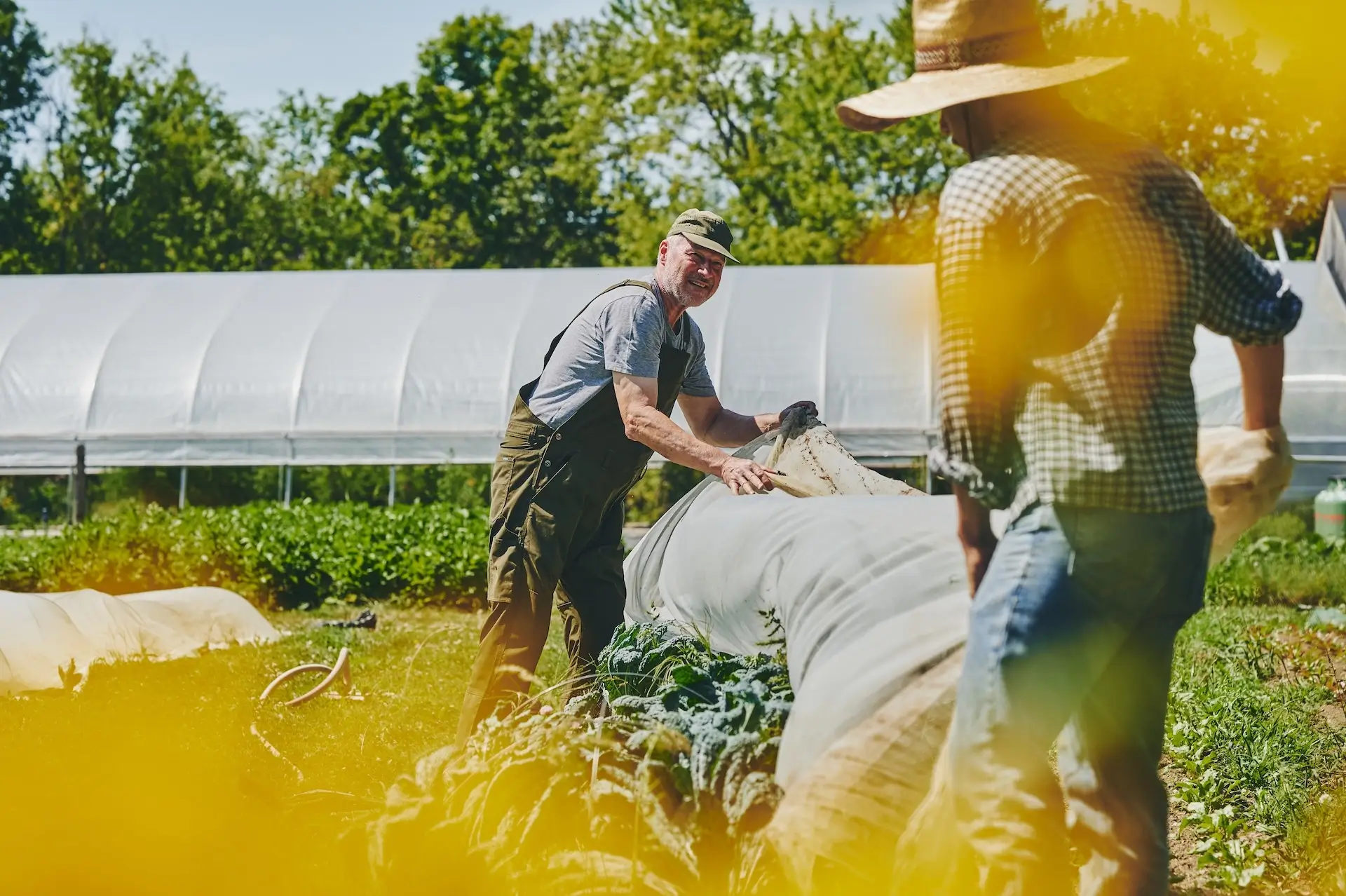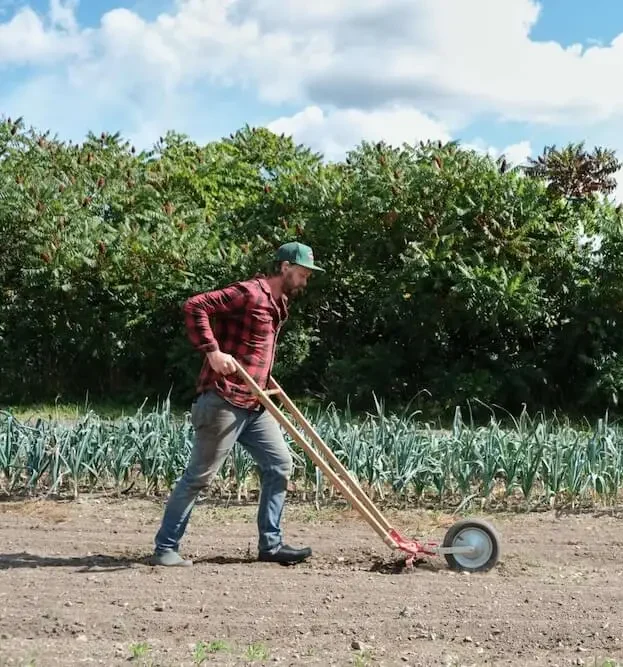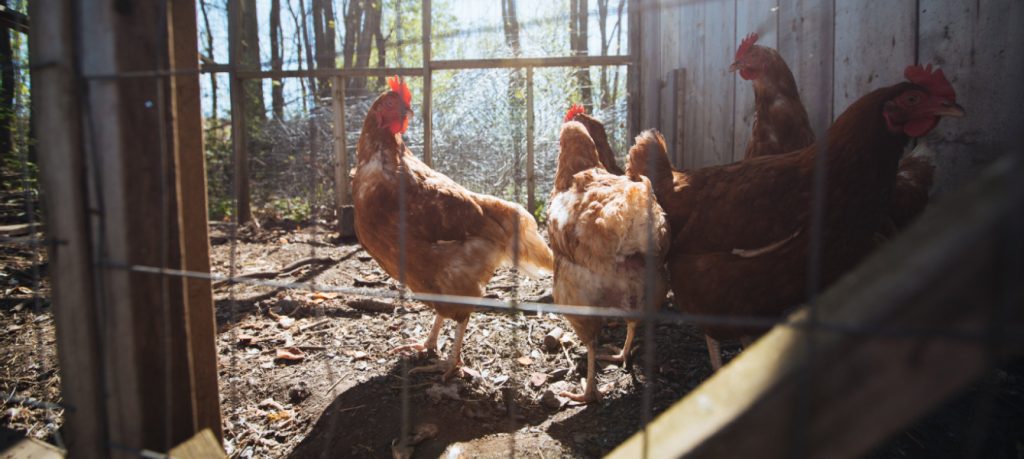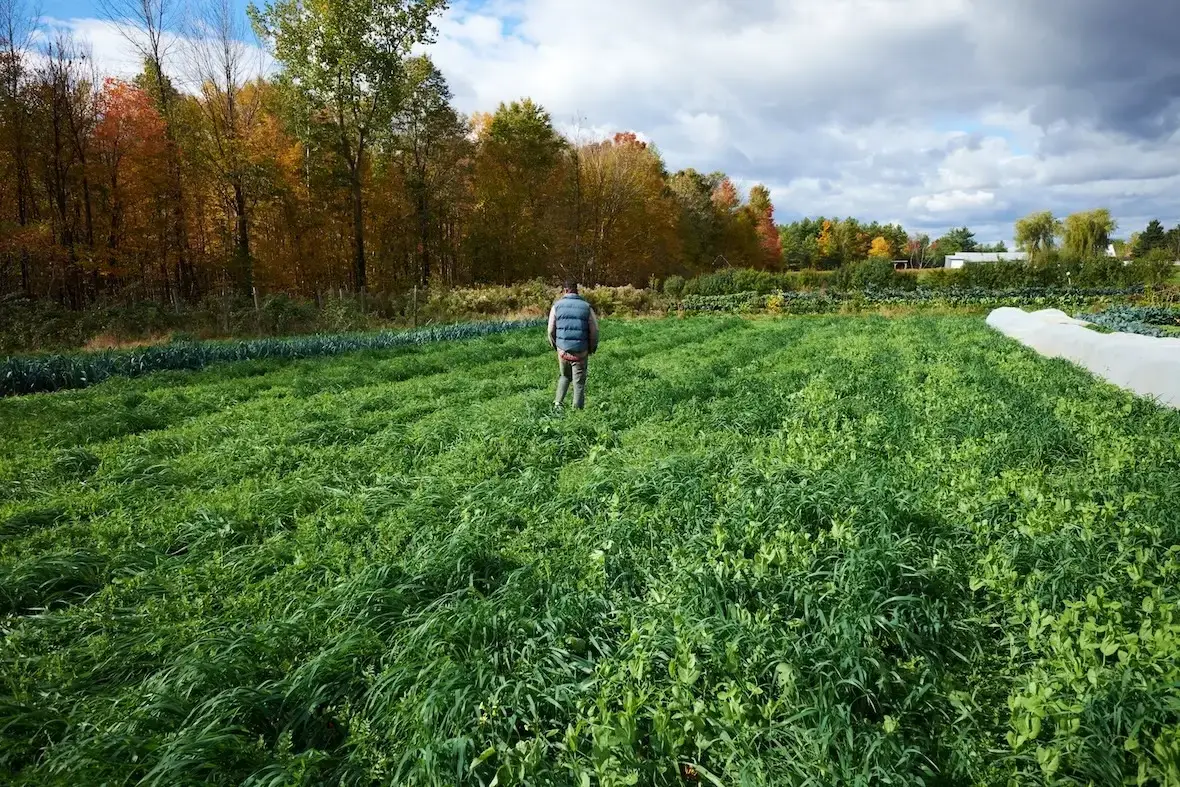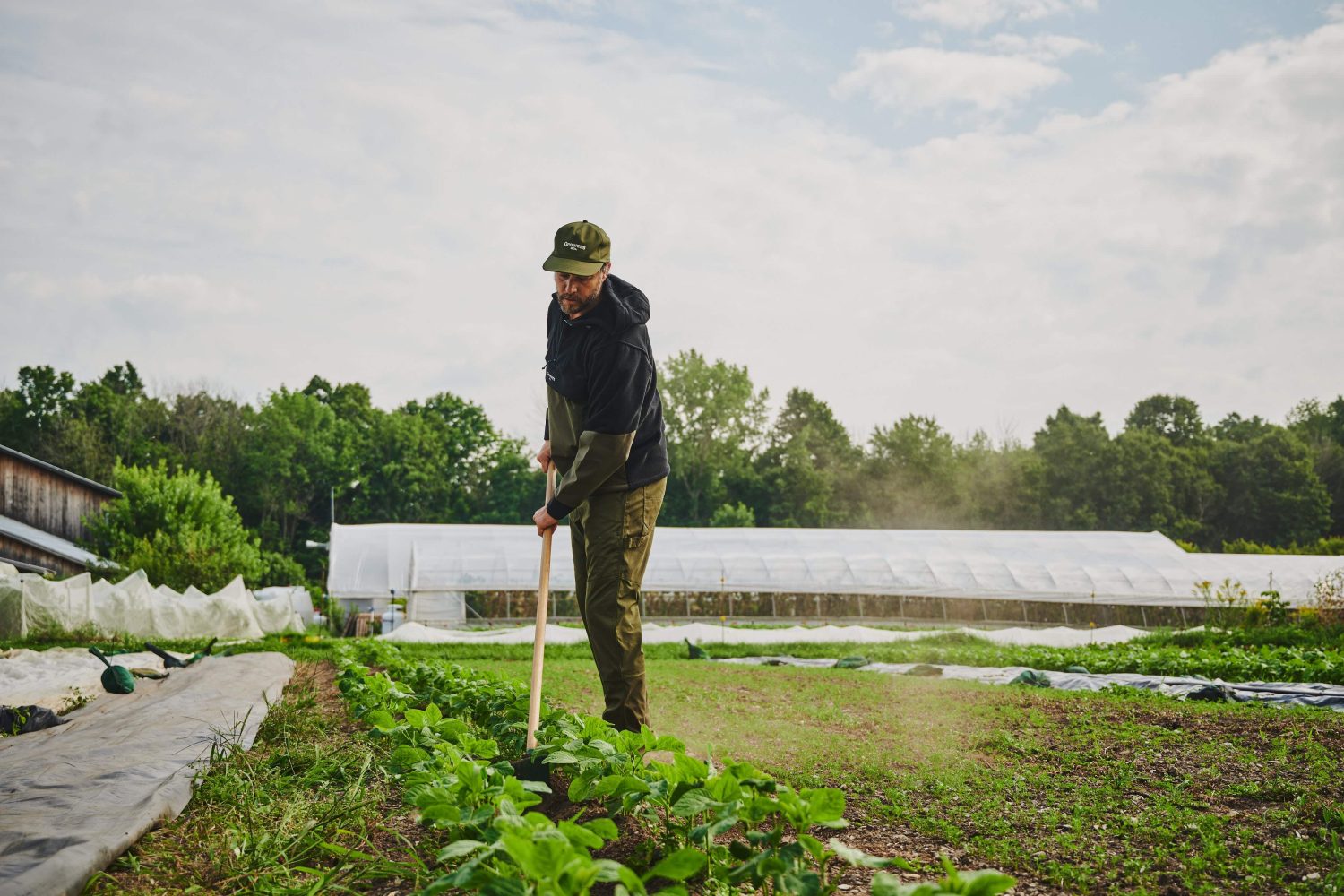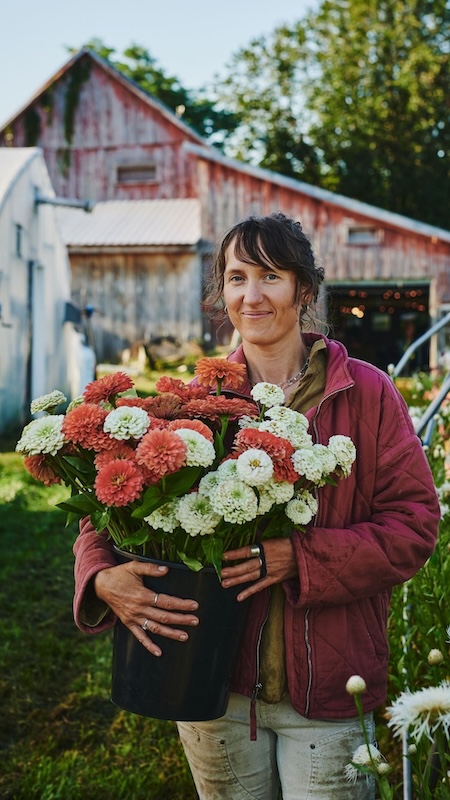To diversify your production or not? That’s the question! We met with growers who have chosen to diversify their vegetable production and produce eggs on a small-scale farm. Whether you are an established market gardener or considering to undertake your own project, these testimonials will help you to get a sense of whether this adventure is right for you.
Have you ever thought of diversifying your vegetable production with the addition of free-range eggs? We spoke with 3 vegetable farmers to learn about their experiences and provide a space for them to share the knowledge they have gained on this adventure. Before going any further, let us introduce you to them.
Alexandre Ouellette, Ferme La Pelletée
Saint-Marcel-de-Richelieu, Quebec, Canada
La Pelletée is entering its fourth year of organic market garden production, sold via CSA baskets in Monteregie and Montreal, as well as to restaurants. 95 hens were added to the farm in 2020 and will return in 2021. The eggs are not an integral part of the CSA baskets; they are sold as extras to interested subscribers directly at the drop-off point.
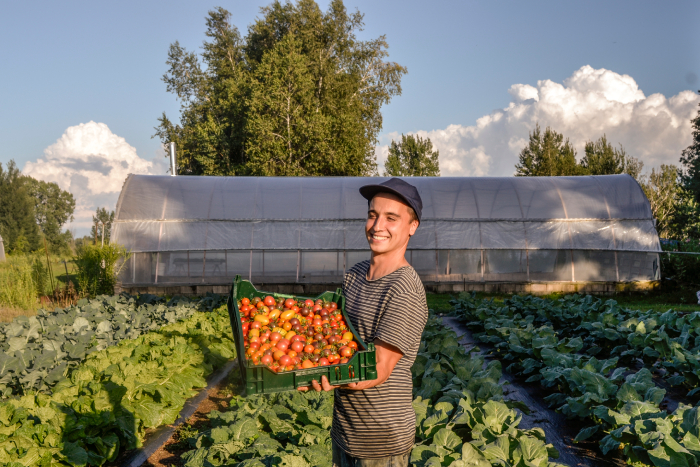
François Boulianne, Brouettes et Courgettes
Saint-Octave-de-Metis, Quebec, Canada
Brouettes et Courgettes started in 2014 and added egg production in 2016. The farm has 99 hens in the summer and about 60 in the winter. The eggs are not part of the CSA baskets, they are sold as extras to interested subscribers directly at the drop-off point. They are also sold at the public markets of Saint-Flavie in the summer followed by Rimouski at the end of the season. Then, in the winter, they go on sale via the website where people order and have them delivered to their homes.
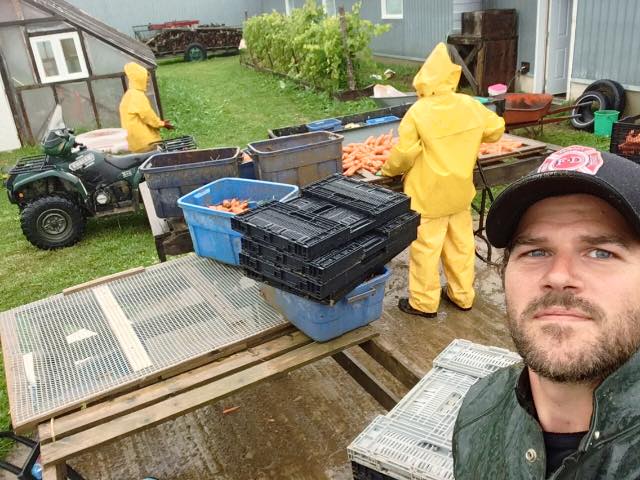
Mathieu Fontaine, Jardins du Futur Simple
Saint-Vallier, Quebec, Canada
Les Jardins du Futur Simple are entering their sixth season of organic vegetable production, sold in CSA baskets in Levis and at the farm in Bellechasse.
99 hens were added to the production in 2019 and the eggs were offered as an option to subscribers. This option has come to an end in 2021 as 2020 was a difficult year for the chicken coop. The flock has been reduced and the organic eggs will only be offered at the farm store.
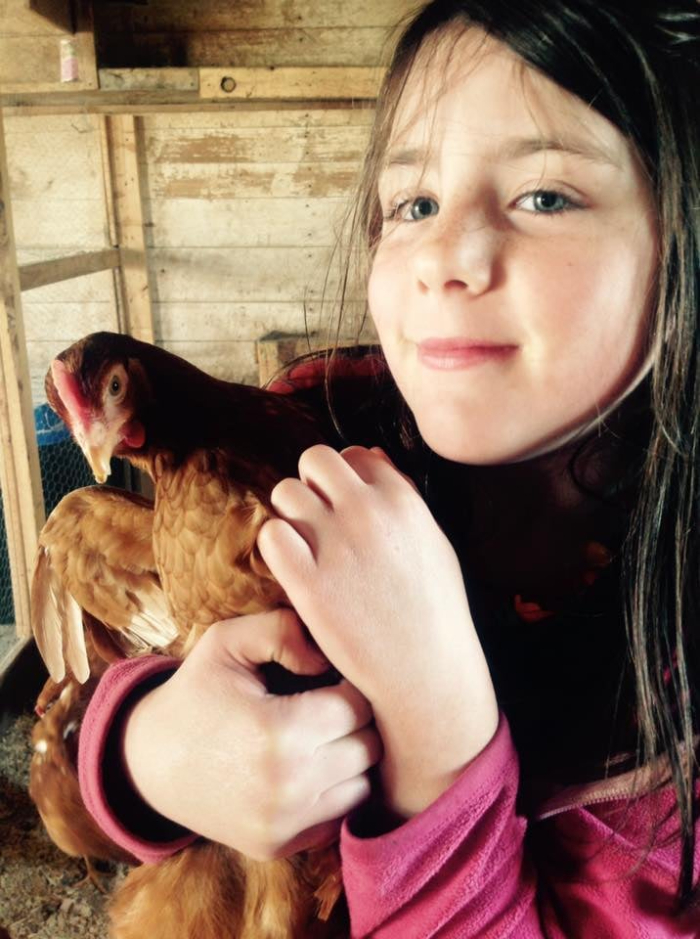
What’s Involved in Producing Eggs on a Small-scale Farm?
- A regulated outline
In Quebec, chicken eggs are governed by supply management. It is forbidden to have more than 99 laying hens without a quota.
- Initial investments
Although chickens spend their days on grass, they roost in a coop at night. It must be spacious enough to ensure the flock’s well-being, and safe enough to protect them from predators. There are different options, from creating a space in an existing building to building a fixed or mobile coop. Whichever option you choose, you should plan for a budget to build or furnish the coop, including electric fences for the pastures, feeders and drinking troughs.
- Daily care
While it doesn’t take very long to start producing eggs on a small-scale farm, it is a daily routine, often in the mornings and the evenings, weekdays as well as weekends, and during both the high season and the low season.
- Regulations
In Quebec, egg production exceeding the quota must be sold in a short circuit distribution. This limits marketing opportunities with restaurants or grocers. Other regulations that must be respected include indicating certain information on the packaging such as the name and address of the farm, expiration date (calculated 30 days after laying), and the words “ungraded eggs” and “keep refrigerated”.
What Are the Benefits of Offering Free-range Eggs as a Complement to Your Vegetable Offering?
- Free-range eggs are easy to sell
“Once people understand how our hens are raised, we have no trouble selling all our eggs,” says Alexandre Ouellette of La Pelletée Farm. “There are no losses. Our subscribers are happy to have access to another product that comes from our farm in addition to the vegetables: once that sense of belonging is developed, it just makes sense for them to increase their portion of groceries coming from the farm.” The eggs sell well and the subscribers are happy: two benefits also reiterated by Mathieu Fontaine and François Boulianne. All three also note that the eggs are of particular interest at the beginning of the season when the baskets are not as diverse.
- Free-range eggs as a loss leader
There is demand for free-range eggs, and it’s probably not going to change despite the higher price. “Our subscribers trust us, they’re with us because they already have a desire to eat well and support respectful agriculture. We’ve never had to justify our prices,” says Mathieu Fontaine of Les Jardins du Futur Simple. “And when customers taste farm eggs they don’t go back.” Initially, Mathieu Fontaine’s “egg option” subscriptions at Les Jardins du Futur Simple were a real selling point for his CSA basket subscriptions. That’s less the case today, he notes: eggs or not, his waiting list for CSA baskets is growing.
For François, eggs remain a draw for his market stall as well as for winter produce orders: “Some people start an order on our site because they need eggs, and while they’re at it, they buy their onions, carrots, and other storage vegetables that they might otherwise have picked up at the supermarket. The appeal of free-range eggs helps sell our produce in the off season. This is one of the main reasons we produce eggs on a small-scale farm.”
- Farm eggs allow you to exploit your space in a new way
At La Pelletée, the total land area is much larger than the area farmed. “Having chicken and the equipment to produce eggs on a small-scale farm is a way for us to maximize the usage or our land” explains Alexandre Ouellette.
- A helping hand to clean up gardens and greenhouses
François, of Brouettes et Courgettes, sends his chickens into his greenhouses to “clean up” at the end of the season. The free fertilization is an added bonus!
- Build and move a mobile chicken coop without breaking the bank
Alexandre Ouellette’s hen house at La Pelletée was built on the farm by their team. It was built on a trailer base so that it could be moved with a ATV (quad) without the help of a tractor. He says it could be a cost-effective project (especially if there is access to wood on the land) and realistic in that it doesn’t require too much carpentry.
- A relationship with living beings
For Mathieu (Les Jardins du Futur Simple), his wife, and their three daughters, the farm is a living space “where there’s a relationship with living things and with the origin of food and its value, that develops through contact with the animals.” François adds, with a laugh, that “it’s interesting to have animals on the farm, since vegetables don’t have much to say!”
Before Producing Eggs on a Small-scale Farm, What Should I keep in mind?
- Profitability
“Since you’re limited to less than 100 hens, it’s impossible to make economies of scale” says Mathieu Fontaine”. Taking care of 200 hens isn’t that much more time consuming than taking care of 100 hens. Considering that the demand is there, we could sell double our quantity of eggs without doubling the workload needed to care for the hens. I estimate that having a flock of 200 hens would increase the workload by about 20% to 25%. The egg washing would take a little longer, but tending to the flock wouldn’t.” Alexandre Ouellette of La Pelletée can attest to this: he went from 50 hens to 95 hens in the same summer. He confirms that he did not spend more time taking care of his hens when his flock doubled.
If it weren’t for the quotas, all three growers would consider having at least 200 hens. The trio agrees that the quota limit could be updated to give smaller farms a more attractive profit margin. “It’s a shame,” says Alexandre, “but the 99 hens aren’t very profitable. You have to look at benefits other than profitability. We tell ourselves that the hens “pay their rent” and that it’s worth it because the demand is there: we always sell all our eggs and the subscribers are happy.” François Boulianne agrees, pointing out that despite the low profitability, he recognizes the “appeal” of eggs and the benefit of being in contact with the animals.
For his part, Mathieu Fontaine is taking a step back: “I am in the process of expanding my farm. We often ended up washing eggs until 9:00 p.m. while already super tired from our day in the fields. It was a bit of a burden, especially when you put this daily task into perspective with the low profitability.”
- Winter
To keep your chickens for more than a season, you need a space set up in a building or in a greenhouse. ” Greenhouses are something we master as market gardeners, and housing our hens in them during the winter is a way for us to make the most of the greenhouse,” argues Alexandre of La Pelletée. When the hens return to the pasture, the greenhouse is again used to grow crops. Although there are ways to transport water by hand, it is preferable to have access to water and electricity to facilitate caring for the flock. It should be noted that daily care of the flock involves staying on the farm even in winter. To be able to leave the farm, people must be available to take over. Automating is a possibility, but as the market gardeners have determined, given the low profitability of eggs, investments should be minimized.
- Mental load and contingencies
Taking care of a flock of chickens does not require much time, but it is a constant mental load. Alexander gives the example of an unforeseen chicken-related incident that could destabilize a day’s delivery, or worrying if high winds had moved the electric fence. “You wind up stopping what you’re doing to go and make sure everything is okay. Having chickens means being responsible for their safety.”
François agrees, insisting on the importance of protecting his flock: “Predators will be interested in your animals, especially at night”. A disease can also affect the flock, as it happened to Mathieu, and since the profitability is low, it is not always logical to bring in a veterinarian.
Tips for Producing Eggs on a Small-scale Organic Farm
Let’s wrap up with some advice from Alexandre, Mathieu and François for market gardeners who are toying with the idea of starting egg production as a complement to vegetables.
Start with 6 to 10 laying hens, in order to familiarize yourself and see if you like the rhythm and the daily contact with the animals. If you like the experience, go for it! “Don’t wait to find the best chicken coop layout. Learn about hens and the regulations, and get started,” advises Alexandre Ouellette of La Pelletée.
While you’re at it, go for 99 laying hens. The three farmers agree that it’s no more time consuming than caring for a smaller flock. The idea is to maximize the number of eggs you can sell.
Make sure you determine the way your eggs will be sold from the start: you don’t want to lose any. For Mathieu, including eggs in his basket subscriptions is a great way to make sure that all eggs are pre-sold. For Alexandre and François, the drop-off points and markets allow all their eggs to to find a buyer. There are many solutions, the important thing is to have a plan.
If you want to sell free-range eggs, don’t wait too long to find a supplier and reserve your hens and equipment. “There is a craze and it sometimes goes fast,” says Alexandre.
Plan for the same person to care for the hens on a daily basis. “So that it’s easier to observe the flock and detect irregularities,” says Alexandre.
Want to Learn More About Diversification before You Make Your Decision?
If you need additional resources to help you with your organic vegetable production or to learn the best practices for running a profitable farm, we invite you to register for the Market Gardener Masterclass. The Masterclass is a comprehensive, self-paced online course that documents all the steps to successful organic vegetable production. Our method has been developed from over 20 years of experience in organic vegetable gardening. It is designed to help you achieve consistent results that will ensure the success of your operation and your quality of life on your farm.


